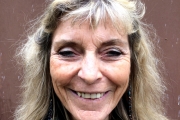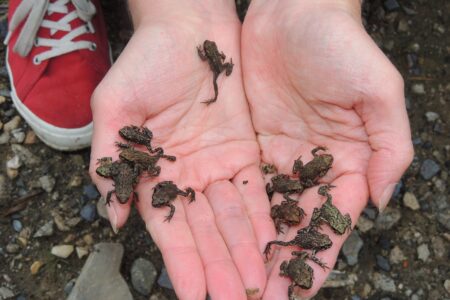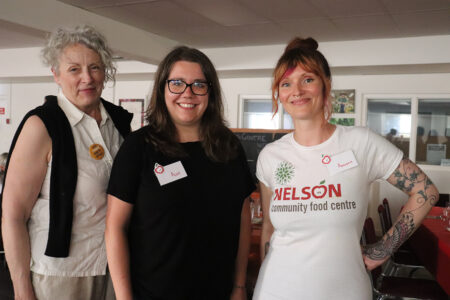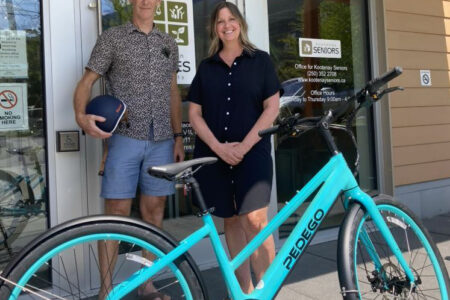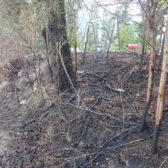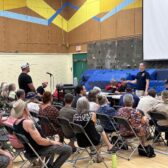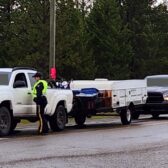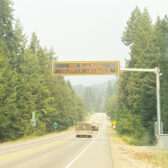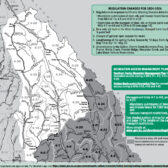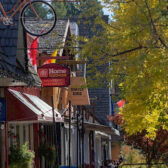Resilience propels Nelson woman forward as she goes blind
Kimberly Russell gets bored easily.
To satisfy her curious mind, she’s been an artist, tree planter, pharmacy assistant, volunteer firefighter, horticulturalist and professional chef.
Now, she’s thinking about tackling pottery or weaving. Because Russell is going blind, she figures tactile activities are best.
“I see the world like a Monet painting – blurred shapes and colours. Maybe I should try to make a living at abstract art!” she says with a laugh.
Russell, who turns 68 this year, was diagnosed with Age-Related Macular Degeneration (AMD) in 2014, which is the leading cause of vision loss in the developed world affecting an estimated one million Canadians.
“Macular degeneration is genetic in my family, but growing up in California where I spent my days in the blazing sun without UV protected sunglasses probably increased my risk significantly,” says Russell.
AMD is a progressive eye disease that affects central vision. Over time, AMD takes away people’s ability to read, drive or see the faces of their loved ones.
While Russell gets monthly eye injections to slow the progression, she is preparing for the inevitable by purging her cherished books and DVDs.
“My bird books are the hardest to say goodbye to,” she says. “I’m a birder, so I will miss that greatly.”
Russell says there hasn’t been one defining moment where everything changed; rather, she is on a continuous journey toward acceptance.
It’s a journey that comes with its challenges though.
“My biggest problem is transportation,” says Russell. “Living in a rural area means that I have to walk seven kilometers to access public transit, which isn’t manageable.”
“The reality is that many people who lose their vision become isolated in their homes. I’m determined not to let that happen.”
Russell found a lifeline when she started receiving post-vision loss rehabilitation services through CNIB (Canadian National Institute for the Blind) and was connected to a peer support group in the Kootenay region.
“We call ourselves The Cross-Communities Crew,” explains Russell. “We’re a vibrant group that wants to get into the world and have fun – like ziplining!”
The group is currently fundraising to buy a van and have already recruited two volunteer drivers to help solve the ongoing dilemma around transportation.
“What our group is ultimately about, is that we are here. We’re alive. We want to participate in life and contribute to our community,” she says.
For Russell, contributing to her community involves raising awareness about blindness and particularly what the white cane means.
“There is a serious lack of knowledge about the white cane,” says Russell. “Often, people rush to get out of my way or race through doors ahead of me because – I don’t know – they think I will slow them down or that there’s something scary about my cane.”
Mastering independent travel skills with the white cane through CNIB is a major goal for Russell, as these skills are a prerequisite for applying for a guide dog which she hopes to do in the near future.
“Right now, when I have to cross the street I need to listen for traffic,” explains Russell. “There have been many occasions where I’ve crossed on a red light. A guide dog would offer me an extra level of security.”
Achieving independence with vision loss is hugely important for Russell – a woman who has dedicated her life to exploration and adventure.
“I don’t know where my resilience comes from,” reflects Russell. “I just love being alive.”
On Saturday, June 11, Kimberly and her Cross-Community Crew will walk in CNIB Night Steps, a 5km fundraising walk under the stars in Nelson to raise funds in support of post-vision loss rehabilitation services.
To help individuals like Kimberly reach their full potential, register for CNIB Night Steps today at www.cnibnightsteps.ca.



